News topics
Monthly Newsletters
// //// //// Online Booking //
// //// // // // // // //
For group bookings please contact
017687 77246 or
contact@derwentwater.org
Eddie Lawless, Skylark Church group. May 2019.
April 2018
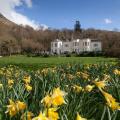
Welcome back to Nat, who volunteered with us in August last year. This time she is working for us as a seasonal assistant, and she has written a wonderful account of the things she has been up to since August. We also have a great piece of writing from Clara Fieger, our most recent volunteer. Clara, from Germany, has volunteered with us twice before, and it is interesting to read about the developments in her art work since her first visit. You can also find out why she now likes to be called Claramara Tongue Head!
This newsletter also contains articles about Crook Primary School’s Viking activities, our temporary moth trap, Conyers School’s walk up Scafell Pike, and the University of Maine’s Rugby match against Keswick RFC.
We still have some availability in April and May, those beautiful, quietly blossoming months before the summer holidays, so it is worth checking our website www.derwentwater.org for the best prices.
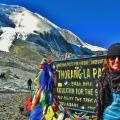
The past few months, by Nat (Hostel assistant, new for 2018)
After my time as a volunteer in August of 2017, 2018 sees me back to Derwentwater Hostel as a seasonal employee. It is always great to come back to an amazing working environment, and even more so when it allows me to continue my quest of bagging all the Wainwrights!
So what have I been up to since August? Well, I have certainly not been idle!
After the Lake District, I went to discover a widely different area of England by volunteering in a small hostel in Scarborough. I thought I would be charmed by the North York Moors, but I ended up falling in love with the coast instead: peppered with picturesque villages (Staithes and Robin Hood's Bay among my favourites), its cliffs battered by the sea on stormy days, inhabited by colonies of screaming gannets, it was pure joy to explore it. England's landscapes have a way of making even rain acceptable and endearing.
But still, after two months of rainy English weather, I decided to fly for bluer - if not always warmer - skies. Destination: Nepal. My main goal, and also the highlight of my trip, was the three weeks spent trekking the Annapurna Circuit and the Annapurna Base Camp Trek. Of course, it was all a child's play for me: who would be impressed by the Annapurna after having been up Helvellyn? Joking aside, I obviously didn't climb the Annapurna. With a fatality rate of over 30% among the climbers attempting its ascent, it is the deadliest of the height-thousanders! The highest point I reached was the Thorung La Pass, at 5416 meters (17,769 ft) of altitude (see photo above).
The previous night was spent in Thorung High Camp, the last possible stop before the pass. It was hard to wrap my mind around the fact that, at 4880 meters (16,010 ft), I was sleeping at an elevation greater than Mont-Blanc! At this altitude, with the lack of oxygen, every step was a struggle, but the beauty of the trek was well worth all this effort. It is important to take your time and enjoy both the ever-changing scenery and the deserted villages with their Tibetan influence. Some say that the Annapurna Circuit is too busy and has lost its charm, but they would be the same ones that grumble when they see a solitary walker in the distance on the quieter fells of the Lake District. I for one enjoyed myself thoroughly and was awed during most of my trek.
I spent an extra month and a half in Nepal, to visit other parts of the country: I volunteered on a tea farm in the Ilam region and in a dog shelter in Kathmandu; I learned how to make momos in Phokara; I got lost for hours in the beautiful city of Bhaktapur; I went looking for tigers in the jungle of Chitwan National Park (where I ‘only’ crossed path with a rhino, a lot of monkeys, and a couple of leeches); I got increasingly frustrated by the nightmare that are Nepalese bus rides; I ate more dal baht than I thought humanly possible; and I spinned an average of 500 prayer wheels per day.
Last but not least, I spent a couple of months at home, in the South of France. Walking my dog in the surrounding hills every day was a good way to keep myself fit before my return to the Lake District.

Well, what can I say about my stay at Barrow House? – already my third stay. Again, I came with the plan that I'd spend my free time doing things for University, since my studies continue from April and there's still a lot to finish from last term. However, again it's turned out that this isn't as easy as expected.
But let’s start at the beginning: the hostel staff had already told me that heavy snow would be around the UK. And my flight from Nuremberg to Manchester was indeed awful. The airplane had already more than two hours delay and was shaking like hell because of the wind. Of course I couldn't get a train to Penrith so late, so I ended up sleeping one night in Manchester instead of arriving in the long-awaited Lake District. That was actually okay: I still enjoyed every minute and had a Cinnamon & Raisin Bagel from Sainsbury's to celebrate being back in England.
The next day was also quite difficult: all the trains to the north were cancelled because of the ‘bad weather conditions’, but until then I had still not seen any snow. But everybody talked about what had been unleashed – the beast from the east. After a while I managed to travel at least until Preston, where I caught a National Express Bus to Keswick 4 hours later. So I stuffed myself with fish, chips, sauces, chocolate and a pint of apple cider at a pub, then spent the remaining 3 hours in Waterstones which always makes me buy books: I can never resist. So I had to choose between two very different books. I left Huxley's ‘Island’ on the shelf because it probably had the worst book cover which ever existed in any Waterstones, and my choice fell on ‘Pies and Prejudices – In search of the North’ by Stuart Maconie. I thought it would be perfect to read about the North while I am in the North. I didn't like the new book soooo much in the end, but it still has some very true words in it. Already in the prologue it says that the British transport system is ‘a system so ill thought out that it takes longer to get to Norwich from Birmingham than from Birmingham to Moscow’. How right he was, and he hadn't even looked into the face of the beast. Anyway, I survived the windy journey, finally saw the snow outside of the bus, and arrived in Keswick in the evening.
For the next days I tried to catch as many hours in the snow as possible because it started to melt incredibly fast. So I went for some walks before and after my volunteer working shifts. I had walks around the Lake, up to Ashness Bridge, around Walla Crag for hanging around with some icicles (that's a word I’ve learnt during my stay: I always imagine icicles riding bicycles) and of course up Cat Bells where I've actually never walked before even though it seems to be THE attraction to do while you're in Keswick. And it really was absolutely beautiful.
A special highlight was walking up Great End after work on a really sunny, cold day. We walked through fields full of sheep (the ever-smiley ‘Herdy’ breed), and then started to climb more steeply, until eventually we reached the mountain top, which was still full of snow. We were also able to walk on Sprinkling Tarn, without breaking the ice, and above us we could see ice climbers hanging off the mountain face.
In the Lakes one great day follows another, as pronounced by National Trust leaflets. So I went up Glaramara as well. I decided I would change my name from Clara into Claramara if I enjoyed the walk. And I did love it. So from now on I call myself Claramara Tongue Head (which is another great name of a land formation in the Lakes) Fieger. For warming up after walking I can always recommend a pint of beer in front of a fire place in one of the lovely pubs between the footpaths.
Of course being in the Lakes is not only walking: being part of the life in Keswick is also very enjoyable. The Alhambra Cinema had lots of very good movies during the film festival, and its regular programme is excellent too. Having cream tea at Mrs. Fs, which is definitely my favourite coffee shop, not only because of the suiting name. And also meeting friends in the local pubs in the evening. There we talked about being out and about and how to unwind with a pint after days in the fells, laughed about some tourist's problem with the non-working wifi, and discussed the best Puddings and Pies of Barrow House (we still haven’t decided which are the very best yet). You see, there’s not much time left for doing stuff for University.
When I first came to Barrow House for volunteering in 2014, I was just about to apply to the Academy of Fine Arts in Nuremberg. So I had to draw and paint every day. And I really did and enjoyed it. I found out a lot about the Lake District’s nature with studying trees, birds, the waterfalls and the fells. But now I'm in a very different state of my life. There is nearly no drawing or painting in my artwork anymore. I work more with the ambiguity of words, creating poetic situations from everyday life. But when you’re in the Lake District you're always inspired by the landscape. So I still try to do some drawings, but it's not as easy anymore. Especially the question about what should be drawn is very difficult. All this talk at my art school about what is art and what not changes a lot of the creative flow. So what I’m actually doing in that intended ‘free time for my art’ is preparation for upcoming projects, finishing essays, and collecting impressions in all kinds of media. That includes a lot of photography; sketches; taking some voice and sound recordings with an audio recorder; and collecting words, quotes and sentences which can be useful for my word collages.
I still have some days left in the North of England and I am looking forward to exploring a lot more. But still there are many secrets, and things to save, which will bring me back again.
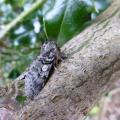
Moth studies, by Alex Helliwell (Hostel assistant)
Between May 2016 and May 2017 I made a hobby of identifying the various species of moth that found their way into the hostel each night. Over the course of the year I managed to identify 115 different species of moth which had been attracted by lights in the hostel, mainly around one of the shower blocks where the window is often left open as it gets quite humid. Last Summer I also attended a few events held by the Cumbria branch of Butterfly Conservation, an organisation dedicated to protecting butterflies, moths and their habitats. The guided walks around various Cumbrian nature reserves were really interesting and I saw lots of fascinating plants and wildlife, whilst learning how the reserves are managed to benefit rare species. I met a few people working for Butterfly Conservation, including Martin Tordoff who kindly arranged the loan of a Skinner Moth Trap for the hostel this year when he heard about my interest.
As expected, the moth trap is far more compact and portable than the shower block we've previously been using to lure them in - it comprises a simple wooden box with clear plastic panels angled downward towards an opening in the centre beneath a very bright light bulb. The moths are attracted by the light and while it is easy for them to enter the box, it is more difficult for them to escape. The wooden box is also filled with old cardboard egg boxes to provide dark recesses for the moths to retreat to once they're captured. We don't turn the light on every night, but at least once a week, and the moths are released after they've been identified. I count and identify them early in the morning, before work, and so far the maximum number found in the trap has been 14, with Yellow Horned and Oak Beauty being the most abundant.
Moths are a crucial component of the ecosystems they dwell in, being important both as pollinators for plants and as food for other animals, such as birds and bats. Studies have shown that the total abundance of moths in Britain has decreased over the last 40 years. Many species are in decline, which is likely to be due largely to habitat loss caused by human activity, though pollution and climate change are also playing a part. Monitoring moth populations allows us to directly observe the human impacts on this portion of Britain's biodiversity over time, as well as allowing us to determine which species are under particular threat and need to be protected. All records of species caught by the trap at the hostel will be sent to Cumbria Biodiversity Data Centre. Apparently there are relatively few people studying moths in the Central Lakes area so hopefully our records will be useful.
We'll keep you updated with our findings throughout the year, and you might also find these links interesting:
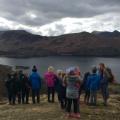
In the past month we've had some interesting school groups, including a sixth form group from Conyers School, and 40 Year 4 pupils from Crook Primary School.
This term the Crook pupils have been exploring the topic 'The Big and the Brave', so we tried to live up to that, with walks and Viking-related activities on and around Derwent Water. We might not be as tough as the Viking 'Beserkas' who whipped themselves into such a frenzy that they felt no pain, but we certainly did well in the cold wind, making the most of the excellent visibility, and getting a good impression of what it would have been like for the Vikings who arrived in Borrowdale in the 10th century, looking for places to settle.
Conyers School also have some brave pupils! 17 sixth formers stayed with us during their Three Peaks Challenge in aid of Sport Relief, reaching the summit of the three highest mountains in England (Scafell Pike, Helvellyn and Skiddaw) within 36 hours. They braved particularly cold conditions, but luckily the visibility was again excellent, and they were rewarded with fantastic views, as you can see from the photo below. Congratulations to the Sport Relief summiteers!
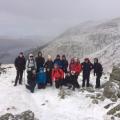

The University of Maine men's Rugby Club, all the way from the USA, stayed with us for one night in March, playing an evening match against Keswick Rugby Club.
The Maine team won, and they held their celebrations and post match 'court room' traditions in the aptly named 'Justice of the Common Pleas' pub (a former police station) in Keswick. As you can imagine, they had quite a late night!





